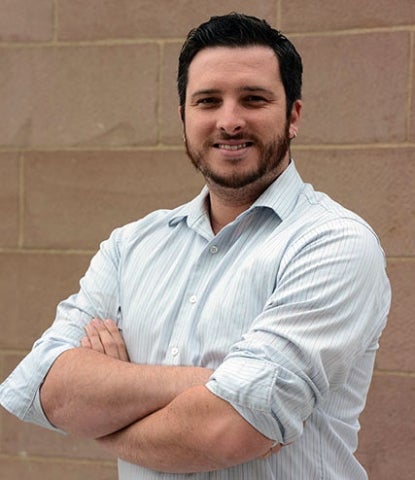Note: Yale School of the Environment (YSE) was formerly known as the Yale School of Forestry & Environmental Studies (F&ES). News articles and events posted prior to July 1, 2020 refer to the School's name at that time.
In the new Showtime series, “Years of Living Dangerously,” the story of global climate change is told by a series of celebrity “correspondents” — including Jessica Alba, Don Cheadle, Harrison Ford and Thomas Friedman. But the real stars of the series are the people who are living with the consequences of a warming world — or working to reduce the harmful effects.
One of those profiled is Brendan Edgerton M.E.M. ‘15 M.B.A. ‘15, whom filmmakers chose to spotlight while he was an Environmental Defense Fund Climate Corps Fellow last summer. In an interview, Edgerton explains how he ended up in the series, what it was like to have a camera crew following his every move, and what he hopes will come out of the film.
One of those profiled is Brendan Edgerton M.E.M. ‘15 M.B.A. ‘15, whom filmmakers chose to spotlight while he was an Environmental Defense Fund Climate Corps Fellow last summer. In an interview, Edgerton explains how he ended up in the series, what it was like to have a camera crew following his every move, and what he hopes will come out of the film.
 Brendan Edgerton
Brendan Edgerton
Q: So how did you end up in “Years of Living Dangerously”?
EDGERTON: It was just a matter of being in the right place at the right time. I had accepted an offer with Climate Corps and they had placed me with Office Depot. And all the while Showtime was in talks with the Environmental Defense Fund to do some filming for the series. Once Office Depot gave the go-ahead for it, I saw the opportunity. And I was just able to jump in.
Q: What were you doing that they wanted to feature in the series?
EDGERTON: Mostly it was doing energy audits and looking at opportunities to improve energy efficiency. For example, Office Depot flew me up to their distribution center in Pennsylvania, where I took a tour of some of the facilities. The film crew followed me all day, followed me during the tour and my meetings. They really just wanted to film the in-the-field energy assessments that I was doing.
Q: How long did the crews follow you during the course of the summer?
EDGERTON: If I had to guess, it was probably more than 60 hours. Maybe as many as 100 hours. There were a few days throughout the summer when they followed me pretty much the whole day. One time they came to the apartment where my girlfriend and I were staying and did some filming there, as well. I think they just wanted to capture a more personal side of me. I think that’s part of the whole idea of the program, to put a face to the people confronted with climate change and the people doing something about it.
Q: So did you get used to having the camera in your face?
EDGERTON: At first I definitely wasn’t comfortable. It took some getting used to having the microphone pack on and being mic’d up for most of the day. And having to be on all the time. But, for the most part, after a while I just had plenty of stuff to be focused on with work. So I would come in 15 minutes early, they would mic me up and I would go through my normal day. To the point where I could block them out pretty easily. Which I kind of had to.
They were at the final presentation that I gave to some of the higher-ups at Office Depot — they were there filming that, too. Even with the senior vice president of supply chain being there, and then the global environmental director, I also had to give the presentation for Showtime, too, which was a whole other level. So I tried to convince myself that they weren’t there.
Q: Did this whet your appetite for more on-camera talent work?
EDGERTON: No, it did not. I didn’t catch a bug for TV or film work. It was definitely an experience and one I’ll remember forever, but I’ m in no rush to get in front of another camera.
Q: Any particular experiences that were especially memorable?
EDGERTON: They flew me back to L.A. in September so that I could do some filming back there. They flew me back with the two other Climate Corps fellows out there, and we met with Jessica Alba and spent most of the day with her, and she interviewed us and gave us a tour of her company. That was a pretty neat experience.
Q: What do you think about the way [the producers] framed this series, telling the stories of regular people but through the narration of celebrities?
EDGERTON: I think it’s a good idea. They’re using the kind of names that might pull the attention of the more viewers. But once they get into it, it’s the stories of farmers in developing countries — who are extremely vulnerable to drought and floods — those people are going to keep people coming back for more throughout the series.
Q: What will viewers come away with after watching your specific role in the series?
EDGERTON: More than anything, I think they’ll see that things can be done. it shows that some basic energy efficiency programs can make a big difference. Renewable energy is the next level, but the cost of that is coming down, and that’s really the next thing we have to go to.
As far as the larger series, I hope the debate is pretty much put to rest. There’s no debate anymore. It’s just counterproductive. It’s more about what we can do to start reversing the tide.
Published
April 8, 2014